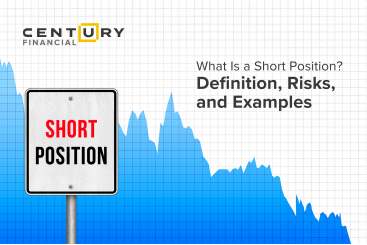Tuesday, August 15, 2023
Asian markets show Optimism: Is it the right time to buy Chinese stocks?
By Century Financial in 'Blog'


In the dynamic world of global finance, the Asian markets have recently emerged as a beacon of optimism, signalling renewed investor confidence in the region's economic prowess. Among the diverse array of investment opportunities, one particular area that has caught the attention of astute investors is the Chinese stock market. As geopolitical landscapes shift and the global economic recovery gains momentum, the question arises: Is this the right time to buy Chinese stocks?
Overview of the Asian Markets
.png)
According to the International Monetary Fund, solid growth in emerging markets in Asia is expected to continue going forward. In its latest economic forecast, the IMF has pencilled in annual GDP growth of 4.6% for emerging and developing Asia in 2022, rising to 5% in 2023. By contrast, it predicts more subdued growth of 2.3% and 1% in the United States and 2.6% and 1.2% in the Euro Area in 2022 and 2023, respectively.
Let’s go to a little bit of History.
China's trade and investment reforms and incentives led to a surge in FDI beginning in the early 1990s. Such flows have been a primary source of China's productivity gains and rapid economic and trade growth.
.jpg)
Since opening up to foreign trade and investment and implementing free-market reforms in 1979, China has been among the world’s fastest-growing economies, with actual annual gross domestic product (GDP) growth averaging 9.5% through 2018, a pace described by the World Bank as “the fastest sustained expansion by a major economy in history.
The "Made in China 2025" initiative, announced in 2015, is one of several recently announced ambitious projects aimed at increasing the competitiveness of Chinese industries, fostering Chinese brands, boosting innovation, and reducing China's reliance on foreign technology by making China a significant or dominant global manufacturer of various technologies.
Read about the significant Chinese sectors here:
China's Economic Growth and Reforms: 1979-the Present
The Chinese government has made innovation a top priority in its economic planning through several high-profile initiatives:
The Trend of Pre and Post Covid China
.png)
China and India are huge markets, each representing 18% of the world’s population (World Bank, 2021).
China enjoyed an economic boost in 2023 after Covid restrictions were lifted.
China’s economic growth accelerated to 4.5% over a year earlier in the three months ending in March from the previous quarter’s 2.9%.
As of March 2023, new and actual export orders have started to rise.[2] If exports continue to grow at this rate, the economic recovery may be more robust.
Domestic consumption began to recover shortly after China lifted its zero-COVID policies.
.png)
Growth of the Chinese Market
.png)
China’s GDP in the second quarter grew 6.3% from a year ago, missing market expectations of 7.3%. Following a solid first-quarter rebound, China’s manufacturing, real estate, and credit activities show signs of moderating. Chinese financial assets still offer diversification benefits. Stocks benefit from macroeconomic policies.
Positive incoming data and lower energy prices favour an upward revision in 2023 GDP forecasts in the US and, mainly, in the Eurozone, while the easing of covid restrictions supports a sharper recovery in China.
Foreign Direct Investment (FDI) flowed into China, fueling infrastructure development, technological advancement, and industrial modernisation. This influx of foreign capital and domestic investment gave rise to an era of rapid urbanisation as cities swelled with people seeking better job prospects and higher living standards.
China's embrace of digitalisation and e-commerce has revolutionised business, fostering new avenues for economic growth and driving efficiency in various sectors.
Chinese Stock Market Outlook
.png)
Chinese stocks have a positive impact on Asian stocks
China is the world's No. 2 economy and home to dozens of companies that trade in the U.S. Meanwhile, regulatory crackdowns vs technology and data-centric firms such as Alibaba (BABA), Tencent (TCEHY) and NetEase (NTES) have been a significant headwind.
China has rapidly become an essential driver outside the United States for Asian financial markets.
China trades extensively with other Asian-Pacific economies. This reflects China’s significant role in the Asian production chain, as well as its expanding capacity in generating final demand for Asian exports
the establishment of the Shanghai-Hong Kong Stock Connect and the Shenzhen-Hong Kong Stock Connect programs has allowed international investors to trade Chinese shares directly through the Hong Kong Stock Exchange, making it easier for them to participate in China's growth story.
.png)
China has recognised the importance of sustainable development and environmental protection. As part of its commitment to combat climate change, the Chinese government has introduced policies and incentives to promote green industries and renewable energy.
Including Chinese bonds in global bond indices, such as the Bloomberg Barclays Global Aggregate Index, has increased the flow of foreign capital into the country's debt markets. As the capital market continues to open up, foreign investments will likely drive further growth in the Chinese stock market.
Start you investment journey in the Chinese stocks with Century Financials
This marketing and educational content has been created by Century Financial Consultancy LLC (“Century”) for general information only. It does not constitute investment, legal, tax, or other professional advice, nor does it constitute a recommendation, offer, or solicitation to buy or sell any financial instrument. The material does not take into account your investment objectives, financial situation, or particular needs.
The opinions expressed by the hosts, speakers, or guests are their own and may change without notice. Information is based on sources we consider to be reliable; however, Century does not guarantee its accuracy, completeness, or timeliness and accepts no liability for any loss arising from reliance on this content.
Trading and investing involve significant risk, and losses may exceed initial deposits. Past performance is not indicative of future results. CFDs and other leveraged products are complex instruments that may not be suitable for all investors. Please ensure you understand how these products work, the associated risks, and seek independent professional advice if necessary.
Century is licensed and regulated by the UAE Capital Market Authority (CMA) under License Nos. 20200000028 and 301044.
Please refer to the full risk disclosure mentioned on our website.




__1439480927.jpg)




.png)
.png)
.png)
.png)


